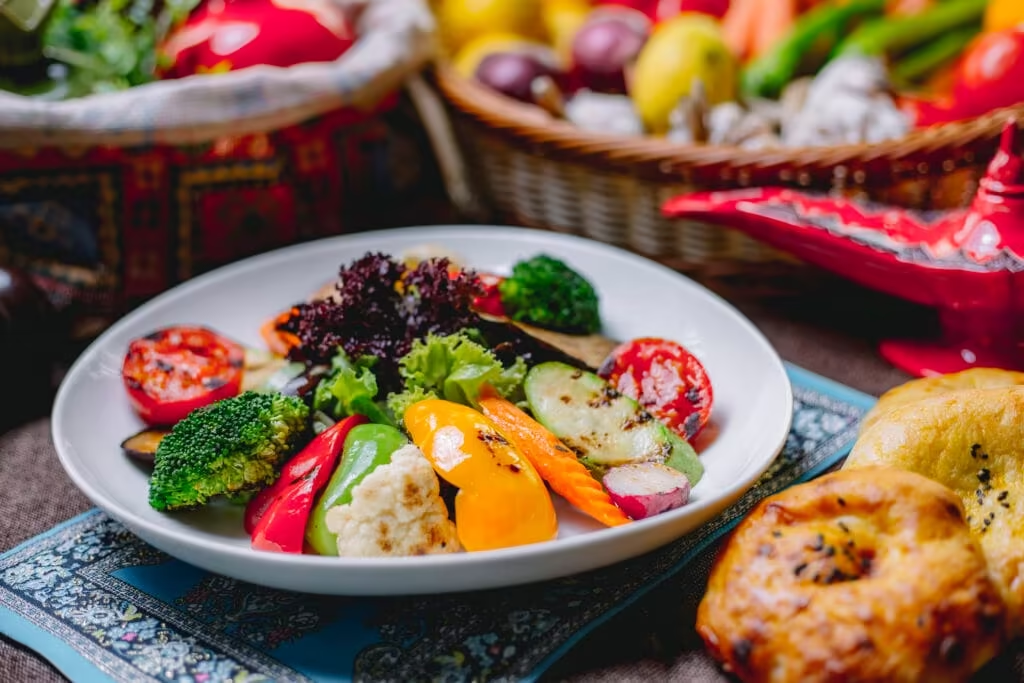Building healthy dinner habits doesn’t mean being perfect; instead, it’s about finding balance, staying consistent, and making small, intentional changes. For instance, by focusing on simple habits and planning ahead, you can turn your dinners into moments of joy and nourishment. Moreover, these small steps will gradually help you create a lasting routine that supports both your health and happiness.
Table of Contents
Healthy Dinner Habits: Meal Planning for Success
Planning your meals ahead of time simplifies your week, reduces stress, and promotes balanced eating. Learn more about healthy dinner habits here.
- Set a Weekly Menu: Dedicate 30 minutes over the weekend to outline dinners for the coming week. Include a mix of proteins, grains, and vegetables to keep your meals varied and satisfying.
- Batch Cook Essentials: Prepare staples like quinoa, rice, roasted vegetables, or grilled chicken in advance. These can be used throughout the week to quickly assemble meals. Explore batch cooking tips.
- Stick to a Grocery List: Plan your shopping based on your menu to avoid impulse purchases. This saves money, reduces waste, and keeps you focused on healthy ingredients. Find budget-friendly meal ideas.
Pro Tip: Keep a rotating list of 5–10 favorite recipes for busy nights. This simplifies decision-making while maintaining variety.
Healthy Dinner Habits: Simplify with Batch Cooking
Batch cooking is essential for busy lifestyles. It allows you to prep large portions of core ingredients, reducing daily workload. Discover batch cooking recipes.
- Prepare in Bulk: Cook soups, stews, proteins (like baked chicken or tofu), and grains (like brown rice or quinoa) in large quantities. Portion them into meal-sized containers.
- Use Storage Wisely: Store meals in airtight containers, labeling them with dates to ensure freshness. Freeze anything you won’t eat within three days for future use. Learn about healthy storage solutions.
Pro Tip: Choose versatile recipes, like roasted vegetables or beans, that can be repurposed into different meals, such as salads, wraps, or grain bowls.

Healthy Dinner Habits: Involve the Whole Family
Cooking together makes dinner preparation a fun and meaningful way to connect. It’s also an excellent way to share tasks and promote healthier habits for everyone.
- Assign Tasks: Give age-appropriate tasks to family members, such as washing vegetables, measuring ingredients, or setting the table.
- Interactive Themes: Make dinner fun with theme nights like “Pasta Night,” where everyone builds their own pasta dish, or “Taco Night,” with customizable toppings.
- Engage Picky Eaters: Turn trying new ingredients into a game. Let kids choose a new vegetable or spice to experiment with in dinner recipes.
Bonus: Research shows that families who eat together regularly tend to adopt healthier eating habits overall.
Add Excitement to Healthy Dinner Habits with Global Flavors
Adding international flavors to your meals not only keeps them exciting but also helps you discover healthier ways to prepare food. Explore global recipe ideas.
- Mediterranean: Grilled chicken souvlaki paired with a Greek salad.
- Asian: Teriyaki tofu stir-fry with brown rice and steamed broccoli.
- Indian: Chickpea curry served with whole-grain naan or basmati rice. Get started with Indian-inspired dishes.
Why It Works: Global cuisines often focus on fresh ingredients, bold spices, and minimal processed foods. This combination makes meals both healthier and more flavorful.
Healthy Dinner Habits: How to Balance Your Plate
A balanced plate helps you stay full and energized while supporting overall health.
The Balanced Plate Method:
- Half of Your Plate: Fill it with non-starchy vegetables like spinach, broccoli, or roasted peppers.
- One-Quarter: Include lean protein such as grilled fish, chicken, tofu, or legumes.
- One-Quarter: Add healthy carbs like quinoa, sweet potatoes, or whole-grain pasta. Learn about nutrient-dense meals here.
Pro Tip: Use smaller plates to help with portion control and prevent overeating.
Embrace Seasonal Ingredients
Seasonal eating enhances the flavor of your meals while being cost-effective and environmentally friendly.
- Spring: Try asparagus and peas in a light pasta or risotto.
- Summer: Grill zucchini, eggplant, and corn for vibrant salads or side dishes.
- Autumn: Enjoy root vegetables like carrots, squash, and sweet potatoes in hearty soups.
- Winter: Cook Brussels sprouts in the oven and serve them with baked salmon or chicken.
Pro Tip: Explore local farmers’ markets for fresh, in-season produce and new recipe inspiration.

Avoid Common Pitfalls
Even with the best intentions, it’s easy to slip into habits that undermine your goals. Here’s how to stay on track:
- Skipping Veggies: Boost vegetable intake by blending them into sauces, soups, or smoothies.
- Overeating: Serve meals in single portions and eat mindfully to recognize when you’re full.
- Relying on Processed Foods: Swap prepackaged meals for fresh or minimally processed options whenever possible.
Pro Tip: Gradually transition away from unhealthy habits instead of attempting an overnight overhaul.
Tools for Success
“Using the right tools and gadgets not only makes cooking healthy meals easier but also more enjoyable. Additionally, they can simplify your time in the kitchen and add a touch of fun to meal preparation. Here’s how to get started:
Meal Planning Apps: Tools like Mealime or Yummly can help you organize recipes, plan your meals, and create grocery lists with ease, saving time and reducing stress. Discover useful meal prep resources.
Kitchen Gadgets: Consider investing in an Instant Pot for quick, one-pot meals or an air fryer for healthier versions of your favorite fried dishes. These gadgets can speed up cooking and make meal prep a breeze.
By leveraging these tools, you can streamline the cooking process while still maintaining a focus on healthy, delicious meals.
Surmonter les obstacles
Life gets busy, but simple strategies can help you stay consistent:
- Lack of Time: Opt for recipes that can be prepared in 30 minutes or less, or prep ingredients in advance to save time during busy evenings.Limited Cooking Skills: Begin with easy recipes that use just five ingredients, and build your confidence as you try more complex dishes.
- Picky Eaters: Provide customizable meals like grain bowls or tacos, allowing everyone to choose their favorite toppings.
- Budget Constraints: Stick to cost-effective staples such as canned beans, frozen vegetables, and whole grains to create nutritious meals without overspending.
Pro Tip: “Plan your meals based on grocery store discounts to save money.”
Staying Motivated

Consistency is key, and motivation will keep you on track as you work toward your goals. Here are a few tips to help maintain your momentum:
Celebrate Progress: Treat yourself for small achievements, like trying a new recipe or cooking all your dinners for a week. These rewards boost motivation and help reinforce healthy habits.
Track Achievements: Use a journal to record your favorite meals, energy or mood improvements, and new cooking skills you’ve learned. Reflecting on these will show your progress and build a sense of accomplishment.
Pro Tip: Share your journey with friends or family for added accountability and encouragement. Their support can boost your motivation and help you stay committed.ement.
Your Action Plan
Here’s how to put it all together and start today:
- Plan and Cook: Pick one recipe from this guide to try this week.
- Involve Others: Turn cooking into a fun activity by involving family or friends.
- Reflect and Adjust: Review what went well and what could be improved, then make changes to your routine as needed.
Remember, every dinner is a chance to nourish your body, connect with loved ones, and embrace your journey to better health. Start today, and turn your evening meals into moments of joy, growth, and well-being. Each bite helps you build a healthier, more balanced life. Learn how to stay motivated with your health journey.
Long-Term Benefits of Healthy Dinners
Healthy dinners are more than just meals; they are an essential foundation for your physical, emotional, and social well-being. Over time, these habits can profoundly enhance your quality of life. Here’s how:
1. Physical Benefits
Healthy dinners provide more than just a good meal—they offer long-lasting benefits for your body:
Improved Digestion: Balanced meals rich in fiber, protein, and healthy fats support gut health and improve digestion. Fiber from vegetables, whole grains, and legumes helps your digestive system work smoothly, reducing discomfort and promoting regularity.
Boosted Immunity: Eating a variety of fresh, whole foods regularly boosts your immune system, helping your body fight off illnesses and recover faster. Vitamins and antioxidants from fruits and vegetables are key to supporting strong immune function.
Lower Risk of Chronic Diseases: A steady routine of balanced, nutritious dinners helps reduce the risk of lifestyle-related conditions like heart disease, diabetes, and obesity. Incorporating lean proteins, healthy fats, and minimizing processed foods are essential steps toward long-term health and longevity.
By making mindful choices at each meal, you can create lasting benefits that go well beyond immediate satisfaction.
2. Emotional Benefits
“Healthy dinners do more than fuel your body—they also support your mind and emotions.”
- Reduced Stress: The act of cooking and eating mindfully creates a calming ritual to end your day. Preparing fresh ingredients and savoring meals fosters relaxation and mindfulness.
- Sense of Accomplishment: Successfully planning and executing healthy dinners gives you a sense of control and achievement, boosting confidence and emotional well-being.
3. Social Benefits
Shared dinners strengthen relationships and create lasting memories.
- Strengthened Family Bonds: Families who eat together more often build deeper connections and develop healthier eating habits over time.
- Opportunities for Collaboration: Cooking together transforms meal prep into a team activity. Whether it’s with a partner, friends, or children, collaborating in the kitchen fosters togetherness and mutual support.
Making Dining Out Healthier
Maintaining healthy habits while dining out is achievable with a mindful approach:
- Check the menu for dishes labeled as ‘grilled,’ ‘roasted,’ or ‘steamed’ for healthier choices. Skip options like ‘fried,’ ‘creamy,’ or ‘smothered.
- Customize Your Meal: Request dressings or sauces on the side to limit unnecessary fats and sugars. Substitute calorie-heavy sides like fries with a salad or steamed vegetables.
- Manage Portions: Many restaurant servings are larger than needed. Consider sharing a dish with a companion or saving half for leftovers before you begin eating.
- Stay Hydrated: Opt for water, herbal teas, or sparkling water over sugary sodas and alcoholic beverages.
Quick Healthy Dinner Recipes

Here are three easy and delicious options for when you’re short on time:
- Veggie-Packed Stir-Fry (15 Minutes):
- Sauté tofu or chicken with broccoli, bell peppers, and snap peas in soy sauce.
- Serve over pre-cooked brown rice for a quick, balanced meal.
- Sheet Pan Chicken and Veggies (30 Minutes):
- Toss chicken thighs, sweet potatoes, and Brussels sprouts in olive oil with garlic, paprika, and salt.
- Roast at 425°F until cooked through.
- Mediterranean Grain Bowl (20 Minutes):
- Combine cooked quinoa with chickpeas, cherry tomatoes, cucumbers, and feta cheese.
- Top with tzatziki for a refreshing and protein-rich dinner.
Pro Tip: Maintain a list of quick recipes to minimize decision fatigue during weeknights.
Final Steps to Success
Sustaining healthy dinner habits is about consistency and celebrating small wins along the way.
1. Consistency is Key
- Start with manageable goals, such as planning two or three healthy dinners each week. This approach allows you to gradually build consistency without feeling overwhelmed.
- Stock Your Pantry: Keep your pantry stocked with essentials like whole grains, canned beans, and frozen vegetables. These items serve as quick, nutritious meal solutions and can help you easily create healthy dinners, even on busy days.
- By starting small and being prepared, you’ll set yourself up for long-term success in making healthier meal choices.
2. Celebrate Your Wins
- Treat yourself to a new kitchen gadget, a recipe book, or fresh herbs to enhance your cooking experience. These little upgrades can inspire creativity in the kitchen and make preparing healthy meals even more enjoyable.
- Mark Milestones: Celebrate your progress by hosting a themed dinner night. Whether it’s a healthy Italian feast or a colorful veggie spread, sharing your achievements with loved ones not only feels rewarding but also strengthens your commitment to your cooking goals.
3. Your Next Steps
- Dedicate 30 minutes this weekend to meal planning and prepping.
- Choose one new recipe from this guide and give it a try.
- Share your journey by inviting a friend or family member to cook or enjoy a meal together.
A Healthier Life, One Dinner at a Time
Healthy dinners are more than a daily routine—they are a cornerstone of a balanced, fulfilling lifestyle. By adopting simple, actionable habits, you can transform your evenings into moments of nourishment, connection, and joy.
Each meal is a step forward in building a healthier life. Start today, and let your dinner table become a space for care, growth, and inspiration.

